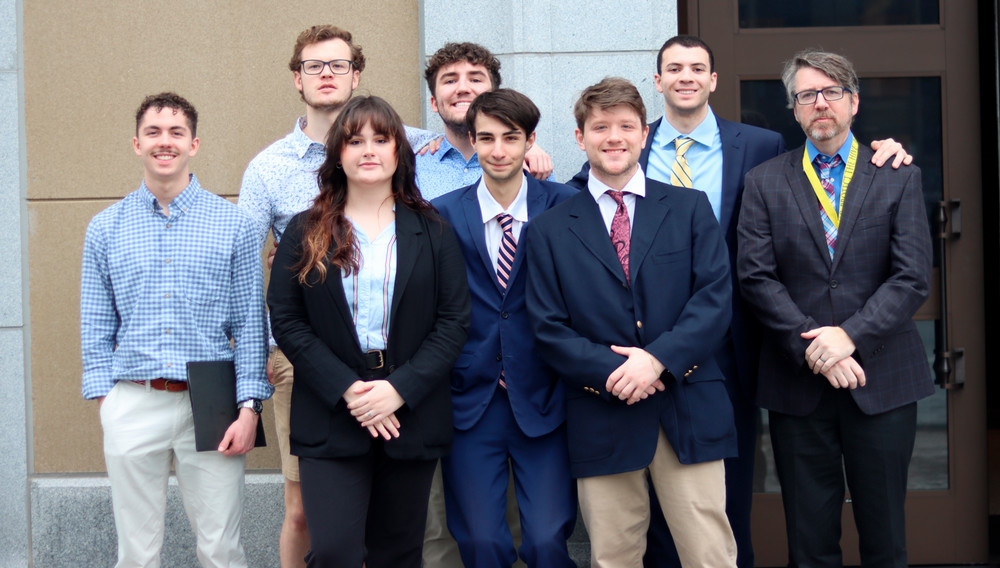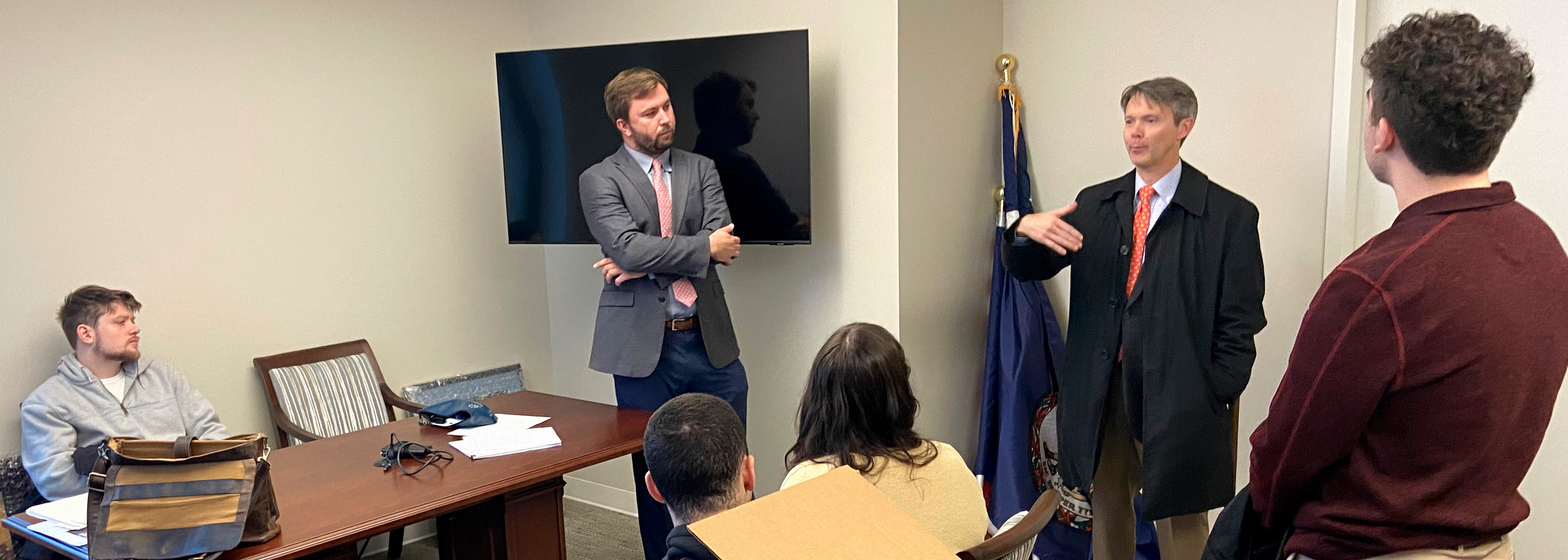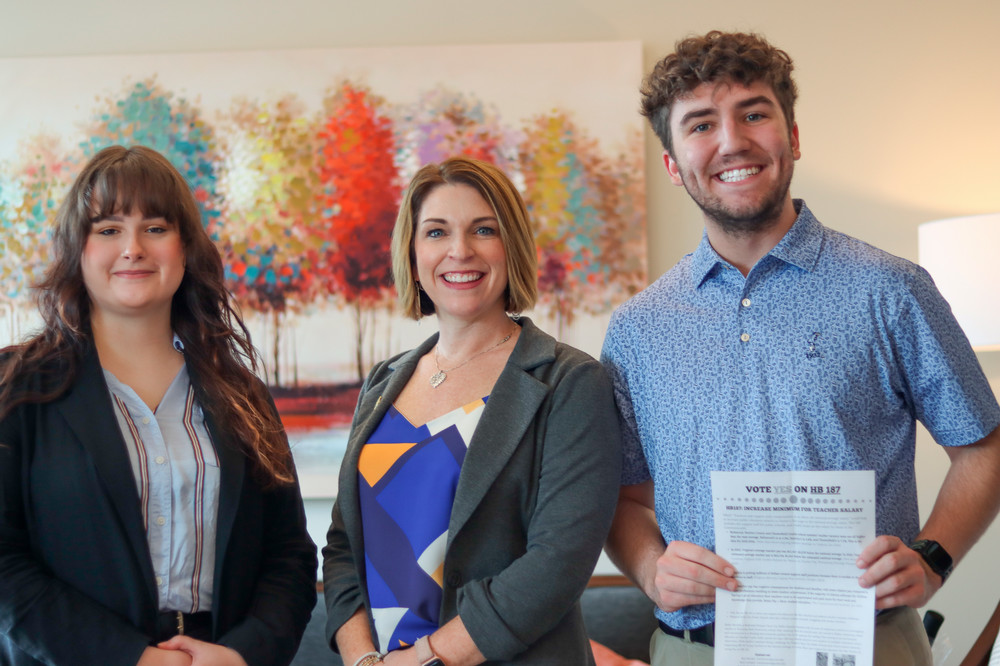ENACT at Randolph-Macon College in Virginia: Breaking Down the Barriers to Civic Participation
Prof. Rich Meagher, ENACT Faculty Fellow
March 2024
When I first joined ENACT as a Faculty Fellow, I thought my college, Randolph-Macon, would offer a good fit for the ENACT course model. Virginia's part-time legislature has a short, one-to-two-month session at the beginning of each year which roughly aligns with our January term, and I thought I could teach a good ENACT course during that time.
Having now taught “Virginia Politics in Action” several times I can say that I was right – but boy, is it hectic!
“Virginia Politics in Action” definitely involves action; my students get a crash course in state politics, legislative advocacy, and civic participation in just four weeks. There's no long buildup to a culminating experience. We're at the legislature on day two, and meeting legislators about our bill by week three. It's immediate gratification!
 PHOTO: The students of "Virginia Politics in Action" with Prof. Rich Meagher (at right) outside the Virginia General Assembly.
PHOTO: The students of "Virginia Politics in Action" with Prof. Rich Meagher (at right) outside the Virginia General Assembly.
It's exciting, both for me and for my students, to jump right in without too much of a net. And it works: the ENACT model is very well-suited for preparing students.
In many ways this mirrors the legislative experience in Virginia. Each year legislators, staffers, reporters, and advocates descend on our capital in downtown Richmond for a frenzy of January and February activity. Literally thousands of bills pass through committee and floor votes during this brief session. The key word for everyone is "firehose" – as in drinking from one!
 PHOTO: Students from "Virginia Politics in Action" meet with Randolp-Macon College alums Baxter Carter (legislative aide to Senate Majority Leader Scott Surovell) and Cal Whitehead (principal of Commonwealth Strategies Group, a government relations firm).
PHOTO: Students from "Virginia Politics in Action" meet with Randolp-Macon College alums Baxter Carter (legislative aide to Senate Majority Leader Scott Surovell) and Cal Whitehead (principal of Commonwealth Strategies Group, a government relations firm).
I especially appreciate how well-represented our little college is at the state legislature. Two representatives are alums, and we have a strong presence among staffers and lobbyists. It really opens my students’ eyes to see how Randolph-Macon College graduates are doing meaningful work (and earning a decent living!) at the state level. Too often we all overlook what is happening in state and local government, and I want our students to know that this is viable and important job and career option that they should consider.

PHOTO: Students Rose Lumpkin (left) and Ren Hinchey (right) meeting with Virginia Delegate Carrie Coyner to advocate for HB 187, a bill to raise teacher pay.
Through their ENACT experiences in “Virginia Politics in Action” my students learn one big lesson that everyone should learn: the barriers to civic participation are not always as high as we think. With some elbow grease – and maybe a little bravery – you can become an effective advocate and help influence the important decisions being made in our state government.
ENACT Faculty Fellow Rich Meagher is Professor and Chair of the Department of Political Science and Director of Social Entrepreneurship at Randolph-Macon College. He holds a PhD in Political Science from the City University of New York: City College.
Reflections from students in Prof. Meagher’s ENACT Course “Virginia Politics in Action” in January 2024:
“My experience in class required me to step outside of my comfort zone and become an expert on a bill pending before the General Assembly. I believe that speaking with legislators and their staff members is the most effective form of advocacy and I was able to speak with around fifteen offices. …Recognizing the need for greater youth involvement in political activism, I became aware of the importance of diverse representation in the rooms where critical policy debates unfold. In these spaces, fostering an environment that welcomes voices from various age groups contributes to a more inclusive legislative process. Alongside seeing more young people in the halls of the state legislature, it is necessary to have people of color, queer-identifying individuals, and people representing diverse cultures, when discussing the impacts of legislation on different sectors of the commonwealth.”
– Ren Hinchey, Randolph-Macon College Class of '25
“When starting this course I knew that I wanted to work in public policy, but I never thought I would see myself working in Virginia state government. This course gave me and my classmates the opportunity to wear the shoes of an advocate, and allowed us to experience the environment of the fast-paced lives of our legislators. It was inspiring to see how many people were actively lobbying and advocating during our time in the General Assembly. … Now that we have experienced what it is like to advocate in the General Assembly, I have been able to see myself working in public policy. As a senior, I had an idea of what I would like to accomplish post-graduation, and now that I have seen the operations of our state government first-hand, I also see myself working in state government. This experience also included networking opportunities with a few Randolph-Macon alumni, which was really awesome.”
– Rose Lumpkin, Randolph-Macon College Class of '24
“Before this class and my advocacy visits to the capital, I was not familiar with the advocacy process at the state and local government level. This experience opened my mind up to the possibility of working in state government because of how responsive the General Assembly members were to the people they work to serve. I was appreciative of every legislator and assistant I was able to talk to and considered this as a career path and way to give back to the public while working for the government. …[T]his experience has guided my focus to state and local government, rather than working at the federal level.”
– Vincent Payne, Randolph-Macon College Class of '25
More about ENACT: The Educational Network for Active Civic Transformation